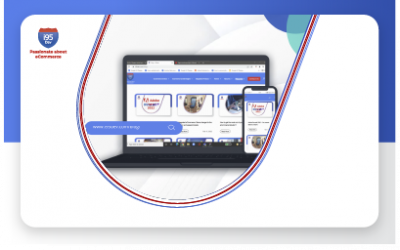A Guide to Move Your
Home Improvement Business to Ecommerce

As the home improvement industry continues to evolve, shifting your business online is no longer just an option—it’s a necessity. To guide you through this transition, we’ve developed the HOME IMPROVEMENT SERIES, covering essential insights and strategies for moving your home improvement business to eCommerce.
- 22 benefits ecommerce home decor furniture businesses
- Key Trends Shaping the Home Décor, Furniture and Lifestyle Industry
- Best Examples of How Home Improvement Merchants Leveraged eCommerce
And this article is a guide all about moving your home improvement business to eCommerce.
Let’s begin,
Two most important steps:
- Selecting the right eCommerce platform
- Selection of the right eCommerce solution provider
Selecting the right eCommerce platform: What to Look for in the eCommerce Platform
Selecting the right eCommerce platform is a pivotal decision that can significantly impact the success for your digital initiative. Whether you’re venturing into the digital realm for the first time or seeking to upgrade your existing platform, understanding the key considerations is paramount.
By the end of this section, you will have clarity on choosing a platform that aligns seamlessly with their goals and caters to the specific needs of the industry. Whether it’s the scalability required for a diverse product range or the flexibility to adapt to evolving market trends, this guide empowers businesses to make an informed decision.
Key factors home décor and furniture businesses must consider when choosing an eCommerce platform:
1) Scalability:
Why It Matters: Scalability is a key consideration, especially for businesses in the home décor and furniture industry, where product catalogs can be extensive and diverse. Your eCommerce platform should have the capacity to grow alongside your business, accommodating an increasing number of products, users, and transactions without compromising performance.
Factors to Consider:
- Product Capacity: Ensure the platform can handle the size of your product catalog, including large images and detailed descriptions.
- Traffic Handling: Assess the platform’s ability to manage peak traffic times, especially during promotions or seasonal spikes.
- International Expansion: If you plan to expand globally, evaluate the platform’s capabilities for managing multiple currencies, languages, and regional variations.
2) Customization Options:
Why It Matters: For businesses in the home décor and furniture industry, where brand aesthetics play a crucial role, customization options are essential. Your eCommerce platform should offer flexibility in design and functionality to reflect the unique identity of your brand and meet the expectations of your target audience.
Factors to Consider:
- Theme Customization: Evaluate the ease of customizing pre-existing themes or templates to align with your brand’s visual identity.
- Product Page Customization: Assess the platform’s capabilities for creating visually appealing and informative product pages, especially important for industries where product aesthetics matter.
- Checkout Process: Ensure the checkout process can be tailored to align with your brand’s user experience preferences.
3) Ease of Use:
Why It Matters: An intuitive and user-friendly eCommerce platform not only streamlines your internal processes but also enhances the overall shopping experience for your customers. A platform that is easy to navigate and manage empowers your team to focus on growing the business rather than grappling with a steep learning curve.
Factors to Consider:
- User Interface: Assess the platform’s dashboard and administrative interface for clarity and ease of use.
- Onboarding Process: Consider the onboarding process for your team and evaluate the availability of training resources.
- Customer Experience: Prioritize platforms that offer a seamless and straightforward shopping experience for your customers.
4) Extensibility and Integration Capabilities:
Why It Matters: The ability to integrate with third-party applications and tools is crucial for enhancing the functionality of your eCommerce platform. This is particularly relevant for businesses in the home décor and furniture industry, where additional features such as augmented reality, product visualization, ERP/ POS integration, or advanced analytics can provide a competitive edge.
Factors to Consider:
- App Marketplace: Explore the platform’s app marketplace for the availability of tools and integrations relevant to your industry.
- API Access: Check if the platform provides access to APIs, allowing for custom integrations based on your specific needs.
- Compatibility: Ensure that the platform integrates seamlessly with your existing tools, such as ERP systems, POS systems, CRM systems, inventory management, and marketing platforms.
5) Support and Security:
Why It Matters: Reliable customer support and robust security measures are non-negotiable elements for any eCommerce platform. In the home décor and furniture industry, where high-value transactions are common, ensuring the safety of customer data is paramount.
Factors to Consider:
- Customer Support: Evaluate the level of customer support provided by the platform, including response times and available support channels.
- Security Features: Assess the platform’s security protocols, including SSL certification, data encryption, and compliance with industry standards.
- Updates and Maintenance: Ensure the platform receives regular updates and maintenance to address security vulnerabilities and provide new features.
6) Cost Considerations:
Why It Matters: Understanding the total cost of ownership is vital for budgetary planning and long-term sustainability. Consider not only the initial setup costs but also ongoing expenses related to hosting, maintenance, and scalability.
Factors to Consider:
- Initial Setup Costs: Evaluate the upfront costs associated with platform implementation, including licensing fees and customization expenses.
- Ongoing Expenses: Consider hosting fees, transaction fees, and any additional costs related to third-party integrations.
- Scalability Costs: Anticipate how costs may evolve as your business scales, and evaluate pricing models that align with your growth trajectory.
7) Mobile Responsiveness:
Why It Matters: With the increasing prevalence of mobile commerce, ensuring that your eCommerce platform is optimized for mobile devices is essential. This is particularly relevant for industries such as home décor and furniture industry, where customers may prefer to browse and shop on mobile devices.
Factors to Consider:
- Mobile-Friendly Design: Assess the platform’s responsiveness on various devices, ensuring a consistent and user-friendly experience.
- Mobile Checkout: Evaluate the mobile checkout process to ensure it is streamlined and efficient for users on smartphones and tablets.
- App Availability: Check if the platform offers a dedicated mobile app or if it is compatible with popular eCommerce mobile apps.
Choosing the right eCommerce platform for your business is a pivotal decision that requires careful consideration of various factors. By understanding your business needs, prioritizing scalability, customization options, and ease of use, you can navigate the vast array of eCommerce platforms available and select one that aligns with your unique requirements. Remember that the ideal platform should not only meet your current needs but also provide a foundation for your business’s future growth and success in the competitive online marketplace.
When it comes to flexibility, security, features and much more, Magento is the best platform.
You may also like our ebook: Building B2B eCommerce Store with Magento
Selection of the eCommerce solution provider: Key Considerations for Choosing the Right eCommerce Solution Provider
The eCommerce solution provider you select to work with is even more crucial than choosing the platform. This solution provider will be your guide throughout the process.
Factors to consider while selecting the solution provider:
- Industry-Specific Expertise: Deep understanding of the industry and business type you deal with
- Support: Ensure 24X7 after-sales support. Evaluate the level of technical support the vendor provides, including response times, dedicated account managers, and proactive problem-solving.
- Flexibility: Open for customizations and third-party integrations
- The time required to get on the floor: It also depends on the customizations, integrations, etc
The Must-Haves of eCommerce Home Improvement: Licenses, Logistics, and Marketing
Licenses
Starting your online business is beyond just having an eCommerce website; it requires the same compliance level that a physical store demands. Having all the licenses in place is always a best practice so that you don’t face unnecessary legal issues.
Below is a list of must-have business licenses and permits :
- Business license, a mandatory document as per the local jurisdiction legally
- Seller’s permit for businesses that deal with taxable goods and services
- Reseller’s permit also known as a resale certificate to avoid being taxed on the resold products twice
- Doing Business As (DBA License) required if you wish to operate with a different company name than your legally registered business name
- Sales tax license
- Occupational license depends on the type of industry you serve
- Employer Identification Number (EIN) needed to identify your business as an independent tax entity
There are some other licenses like environmental permits, professional and trade licenses, etc., you may require these depending upon the industry and the type of business you deal with. Hence, the thumb rule here is always to check with your state and local authorities to avoid legal trouble.
Logistics, delivery system, and shipping
You can either build your own logistics or tie-up with a third party. Merchants who have just stepped into the eCommerce space prefer getting the work done from a vendor. The advantage here is you just need to manage the vendor, and their team will take care of all the logistics bits.
Also, you need to build a shipping strategy and stick to it. While planning, make sure you consider the average product size and the weight you deal with. Consider the locations you wish to ship the products as logistics and infrastructure will change depending upon domestic and international locations. Make sure you have multiple shipping options like same-day delivery, next-day delivery, or timely and cost-effective delivery, as these options delight customers.
Marketing and customer engagement
Marketing efforts are the most crucial step in the whole process. Create a marketing strategy that aligns to your objectives and goals. You can do it yourself or hire a digital marketing agency and get the desired results. Inadequate marketing efforts will fade away the hard work of building an eStore and other developments.
Have a look at some great MAGENTO & i95DEV ECOMMERCE SOLUTION users: B2C and B2B businesses. Click here!
How can we help you?
We assume you must be looking to move your business to an online platform. You need not worry as i95Dev offers full-fledge services that can help you right from setting up your eCommerce platform to do the digital marketing activities for you.
Recent Blogs
Managing Massive Product Catalogs: Why Synchronization is the Key to Efficiency
Managing Massive Product Catalogs: Why Synchronization is the Key to Efficiency Author Category Share The automotive aftermarket industry is vast and highly competitive, requiring businesses...
A Complete Guide to Seamlessly Integrating Adobe Commerce with NetSuite
A Complete Guide to Seamlessly Integrating Adobe Commerce with NetSuite Author Category Share Integrating Adobe Commerce (formerly Magento) with NetSuite ERP can transform the way businesses...
Why Shopify and NetSuite Integration is Crucial for Your eCommerce Success
Why Shopify and NetSuite Integration is Crucial for Your eCommerce Success Author Category Share The digital transformation of commerce is accelerating. According to Gartner, by 2025, a...



